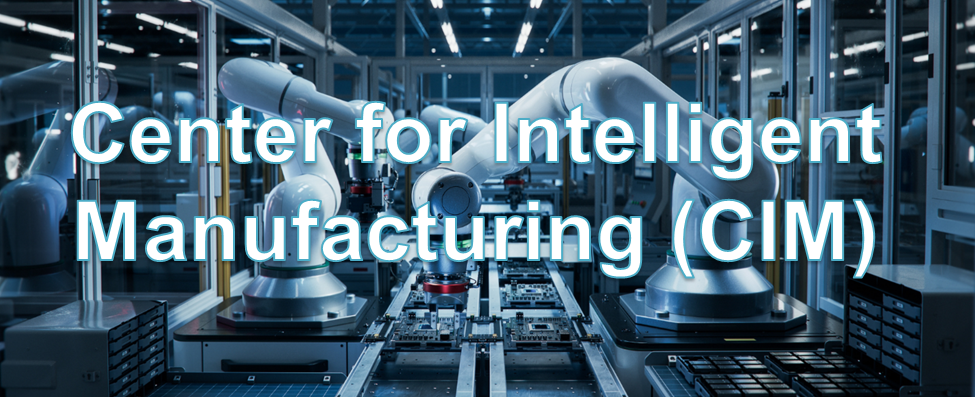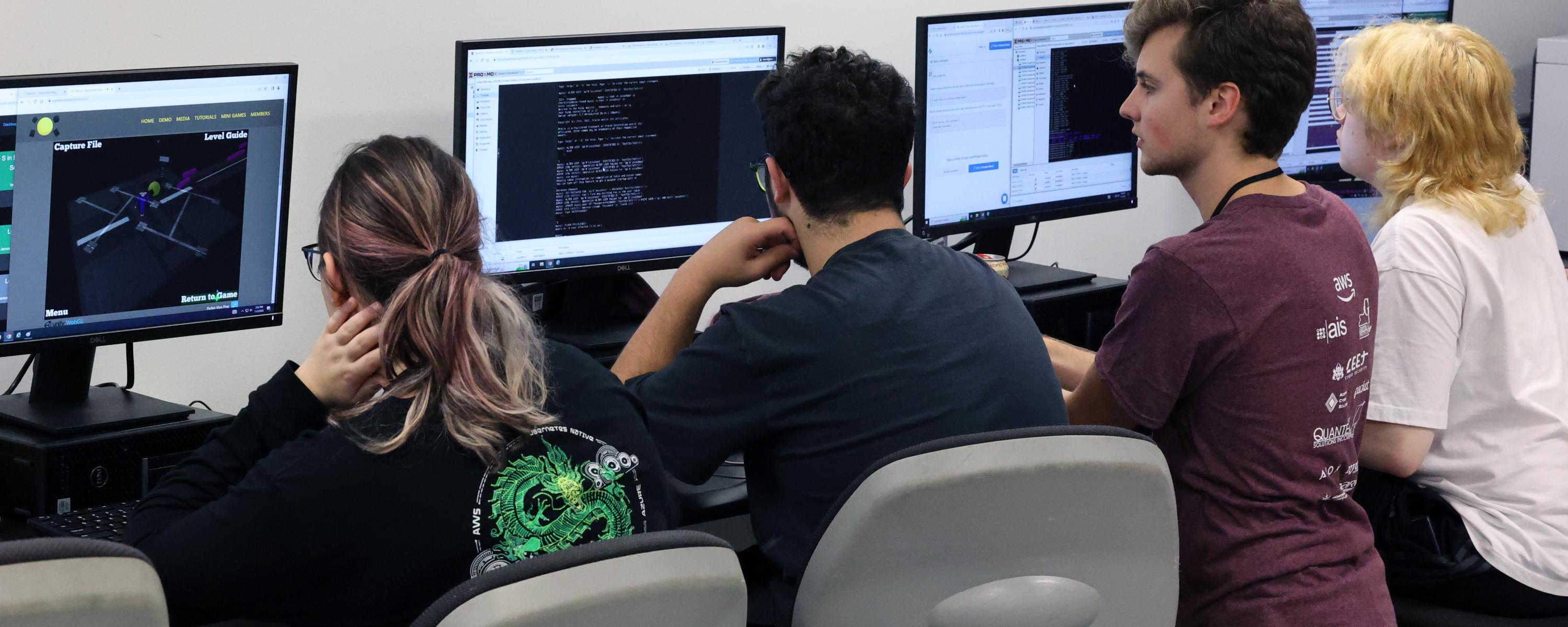
Center for Intelligent Manufacturing (CIM)
Center for Intelligent Manufacturing (CIM) represents a transformative shift in production methodologies, integrating advanced technologies to create adaptive, efficient, and autonomous systems with minimal human intervention, effectively keeping pace with evolving technology. Artificial intelligence (AI)-driven adaptive systems enhance manufacturing processes by enabling real-time decision-making and process optimization. We propose to utilize machine learning algorithms to analyze the challenges, identifying patterns and anomalies that inform predictive processes, product quality, and resource allocation.
AI-Driven Adaptive Systems for Autonomous Production (ASAP) will focus on optimization of energy efficiency and material flows across the supply chain, promoting sustainable resource use and reducing waste. Additionally, the research outcomes will enhance flexibility, allowing manufacturers to swiftly adapt to market changes and customize products to meet specific consumer demands.
Vision: Establish SUNY Polytechnic Institute as a national leader in fostering cutting-edge advancements for developing a robust, intelligent, and sustainable AI-enabled workforce to transform intelligent manufacturing toward multidisciplinary entrepreneurship and workforce development.
Mission: The center unites interdisciplinary expertise across the College of Engineering and the College of Arts and Sciences to drive innovative research, education, and innovation focused on the development and management of intelligent manufacturing systems. These efforts aim to enhance societal well-being and promote a sustainable future for our planet.
Contact: College of Engineering
SUNY Polytechnic Institute, 100 Seymour Rd, Utica, NY 13502
Phone: 315-792-7234
Research: Continuing and Proposed Work
The primary mission of the CIM-A2SAP is to revolutionize manufacturing through AI and automation. The specific objectives include, but are not limited to:
Develop Intelligent Algorithms: Create robust AI and ML models for real-time data analysis, predictive insights, and operational optimization.
Design Adaptive Systems: Engineer systems that dynamically adjust to changing production conditions and requirements.
Implement Autonomous Production: Build fully autonomous production lines with advanced decision-making capabilities.
Enhance Sustainability: Minimize waste, reduce energy consumption, and promote environmentally friendly manufacturing processes.
Promote Industry Collaboration: Establish partnerships with industry leaders to ensure practical applications and scalability of research outcomes.
Train Future Leaders: Develop educational programs to equip students and professionals with skills in intelligent materials manufacturing.
Infrastructure and Resources Development: The funding will provide significant strength for the establishment of essential infrastructure and resources, aimed at advancing innovation and fostering cutting-edge research.
AI and Robotics Laboratory: One of the key initiatives is the strengthening robotics laboratory, which will be advanced and equipped with a wide range of research materials, industrial-grade sensors, and other critical resources necessary for experimentation and development. This laboratory will also be enhanced with advanced software, including state-of-the-art machine learning frameworks as well as sophisticated simulation tools designed to push the boundaries of innovation.
Manufacturing Testbed: Another vital component of the plan involves the establishment of a Manufacturing Testbed. This facility will feature modular production systems specifically designed to enable the testing and development of adaptive manufacturing processes. These systems will provide a flexible and robust platform for exploring advanced manufacturing techniques and optimizing production workflows.
High-Performance Computing Resources: In addition, the funding will be directed toward the acquisition of High-Performance Computing Resources. These resources will include powerful research tools, which are essential for training complex AI models and deploying them effectively. The availability of such advanced computing capabilities will significantly enhance the capacity for large-scale data analysis, simulation, and model development.
Research Professionals

Mohammed Jasim Uddin, PhD, (PI and Director)
Professor, Civil and Mechanical Engineering
Wolfspeed Endowed Chair in Engineering
315-792-7274 | uddinm3@sunypoly.edu

Kazi Imran, PhD, (Co-PI)
Assistant Professor, Engineering Technology
315-792-7543 | imrank@sunypoly.edu

Tarik Dickens, PhD, (Co-PI)
Professor and Interim Associate Chair of Materials Science and Engineering Department
Florida State University
850-645-8987 | dickens@eng.famu.fsu.edu

Victoria Padilla, PhD, (Co-PI)
Assistant Professor, Mechanical Engineering
The University of Texas Rio Grande Valley (UTRGV)
956-665-2643 | victoria.padilla@utrgv.edu
Zhanjie Li, Ph.D. (Collaborator)
Professor, Civil and Mechanical Engineering
315-792-7439 | zhanjie.li@sunypoly.edu
Asif Ahmed, PhD, (Collaborator)
Assistant Professor, Engineering Technology
315-792-7507 | sekaraa@sunypoly.edu
Aarthi Sekaran, PhD (Collaborator)
Assistant Professor of Mechanical Engineering
315-792-7507 | sekaraa@sunypoly.edu
Innovation Goal
Expected Research Impact and Outcomes
The establishment of the CIM-A2SAP will play a key role in transforming the manufacturing landscape and driving innovation in several critical areas.
Advance Manufacturing Technology and Industry Competitiveness: This initiative is set to advance manufacturing technology by enabling groundbreaking developments in AI-driven automation and adaptive systems, allowing industries to integrate cutting-edge solutions that enhance productivity and efficiency. By addressing modern manufacturing challenges, the center will significantly enhance industry competitiveness, offering scalable and effective solutions that ensure businesses remain leaders in increasingly dynamic and competitive global markets.
Support Workforce Development: In addition to its technological focus, the center will prioritize workforce development by providing specialized training programs for engineers and scientists. These programs will equip professionals with the advanced skills and expertise required to thrive in roles centered on intelligent manufacturing, creating a pipeline of talent ready to tackle the demands of a rapidly evolving sector.
Promote Sustainable Advanced Materials Technology: Another critical objective of the center will be to promote sustainability by implementing innovative processes designed to reduce resource consumption and lower environmental impact, contributing to more eco-friendly and efficient production systems.
Brand and External Partnerships: Moreover, the center will act as a hub for collaboration, fostering strong and enduring partnerships between academia, industry, national and defense laboratories, and government. Encouraging joint research partnerships and knowledge exchange, it will create a robust research effort that supports innovation-driven growth and ensures the development of forward-thinking solutions. Through this holistic approach, the CIM-A2SAP will not only address the immediate needs of the manufacturing sector but also lay the foundation for long-term progress, resilience, and sustainability.
Impact
Impact on SUNY Poly Research Mission and Engineering Education
The CIM-A2SAP will serve as a strategic hub to enhance the ability of investigators to network with federal and state funding agencies such as the National Science Foundation (NSF), Department of Energy (DOE), Department of Defense (DOD), National Aeronautics and Space Administration (NASA), National Institute of Standards and Technology (NIST), and state-level economic development and innovation initiatives. The center will provide targeted support for identifying market trends and research priorities, such as AI-driven automation, advanced materials, sustainability, and adaptive manufacturing processes. The PIs will receive guidance in writing competitive proposals aligned with these trends, leveraging the center’s infrastructure and partnerships to demonstrate impactful research capabilities.
The center will host nationwide collaborative research assistants (RAs) and faculty from other research institutions, e.g., Rice, FSU, Memphis, UT, etc., during summer research programs, creating opportunities for collaboration and knowledge exchange. Visiting researchers will contribute to cross-disciplinary projects, expanding the breadth of expertise and fostering innovation. By facilitating these interactions, the center will build a robust research network of scholars and industry leaders, enhancing its profile as a national leader in intelligent manufacturing research. Grant proposals submitted by the center will help advance SUNY Poly's strategic vision and research capacity by funding modern facilities, supporting interdisciplinary teams, and attracting top talent. These efforts will enhance the learning experience for engineering students by integrating smart materials applications with intelligent technologies into their education. Students will gain practical experience with AI, robotics, and manufacturing systems, preparing them for industry challenges. Through workshops, internships, and research collaborations, the center will offer training programs to develop future engineers. These initiatives will provide students with the technical skills and leadership qualities needed to drive innovation in manufacturing, positioning them for success in a changing technological environment.


